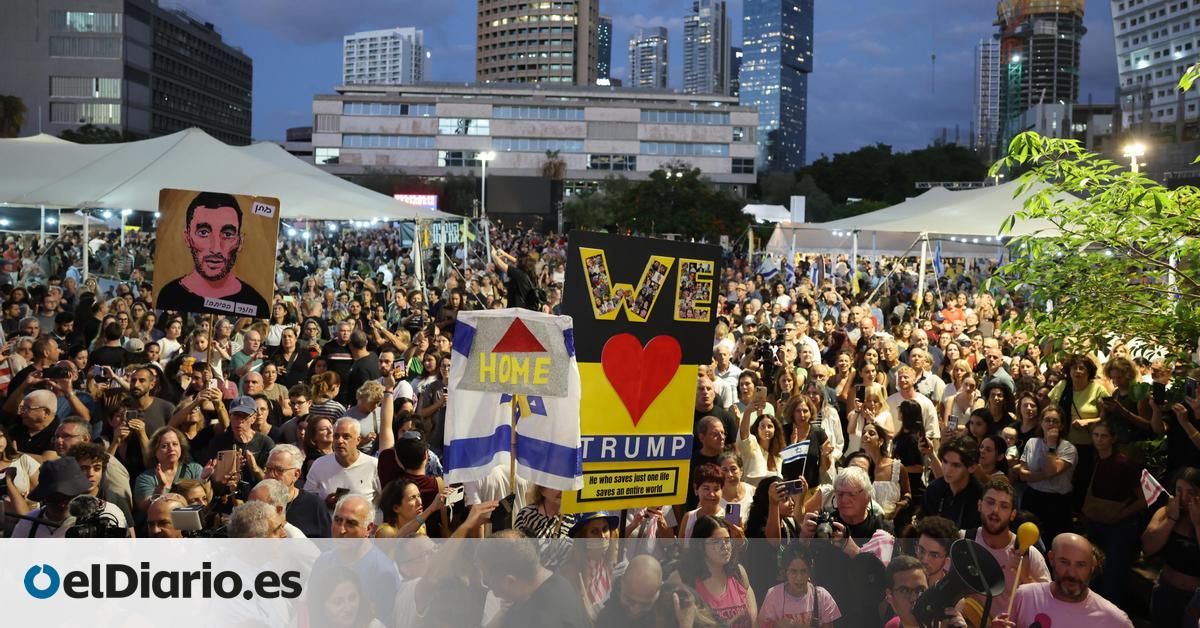
The Israeli Government has given its approval to the agreement with Hamas that was announced early Thursday morning by President Donald Trump. After several hours of meetings between Prime Minister Benjamin Netanyahu and the security cabinet (in charge of making decisions on the war in Gaza) and with all his ministers, some of whom have been against the agreement reached by the Israeli negotiating team through the mediators –Egypt, Qatar, Türkiye and the United States–. The ultra-Israeli executive has approved the first phase of the plan that should lead to a definitive ceasefire in Gaza.
The spokesperson for the Israeli Government’s Public Diplomacy Office had previously explained in a press conference that the ceasefire in Gaza would come into force within 24 hours after the security cabinet approved the agreement. After the pact has been ratified by the Executive, its gradual implementation will begin: first, the entry into force of the ceasefire in Gaza; then, the withdrawal of Israeli troops to a line stipulated during the negotiations and, within a period of 72 hours, the delivery of the hostages – both the living, which are only twenty, and the dead -, according to the spokesperson.
Trump said he is confident that the hostages will be released on “Monday or Tuesday.” He has also announced that he will soon travel to Egypt to sign the agreement between Israel and Hamas, although he has not specified the exact date.
The Minister of Finance, Bezalel Smotrich, one of the most radical members of the coalition government, had already confirmed his rejection of the agreement in the morning in a message on his social networks and had asked Netanyahu to continue “eliminating Hamas” once the hostages have returned. But his no and that of the also Ultra Minister of National Security, Itamar Ben Gvir, were insufficient to prevent this agreement from going ahead.
Hours after the announcement of a ceasefire agreement in Gaza by Donald Trump, the daily hustle and bustle continued on the streets of East Jerusalem, punctuated by a bit of hope. Palestinians in the city and the separate occupied territories of the Strip have had to helplessly watch the genocide of their Gazan brothers over the past two years, in which Israel has killed more than 67,000 people.
Now, everyone hopes that the agreement reached in Egypt between Israel and Hamas, mediated by the host, Qatar, Türkiye and the United States, will put an end to the massacre. However, they do not trust that the Israeli Government and Army will comply with what was agreed and will not resume the offensive against the Strip after the release of the 48 hostages – of whom, only 20 would still be alive.
The Israeli Government has met to give its approval to the agreement by which the 48 Israeli hostages who remain in the hands of the Palestinian militias since October 7, 2023 will be released in exchange for some 1,700 detained Gazans and 250 prisoners sentenced to life imprisonment in Israeli prisons.
Prime Minister Benjamin Netanyahu has held meetings with the security cabinet (in charge of making decisions on the war in Gaza) and with all his ministers, some of whom have been against the agreement reached by the Israeli negotiating team through mediators in recent days. After the approval of the Executive, the ceasefire in Gaza should come into force within 24 hours, as explained by an Israeli Government spokesperson in a press conference, in which she did not offer many more details about the implementation of the pact.
After the ceasefire in Gaza comes into force, Israeli troops should withdraw to a line stipulated during the negotiations and, within 72 hours, all hostages should be released. Trump has said he is confident that the hostages will be released on “Monday or Tuesday.”
Distrust in a definitive ceasefire
“I hope it is the end of the war, Allah willing, but it is not the first time they have stopped and then started again [los ataque contra Gaza]”Zeina, a 19-year-old Palestinian university student in East Jerusalem, tells elDiario.es. She regrets that in the past two years she has not been able to do anything to help the more than two million inhabitants of Gaza, subject to a strict blockade, so even money transfers from other areas of Palestine are restricted.
I don’t think it’s the end of the war, I hope it is, but they can start again after a month
48-year-old Palestinian woman
Ghina, a 48-year-old woman who has come to Jerusalem from the city of Hebron, in the occupied West Bank, to do some shopping, is equally distrustful: “I don’t think it’s the end of the war, I hope it is, but they can start again after a month.” He does not trust the Israeli Government because, he claims, they have broken other agreements.
Last March – after two months of truce agreed upon by Trump’s team, even before the Republican took office – Netanyahu decided to resume the war against the Strip and redoubled both military operations and the blockade of humanitarian aid, which led to famine in the coastal enclave.
I don’t trust Israel, but Trump is going to put pressure because he wants to get the Nobel Peace Prize
73-year-old Palestinian man
Ali Abbasi, based on the experience of his 73 years, is more optimistic and believes that this time it will be different: “The current pressures are going to ensure that the agreement is applied successfully, despite the differences.” “I don’t trust Israel, but Trump is going to exert pressure because he wants to obtain the Nobel Peace Prize,” adds the man who lives in the Silwan neighborhood, in the eastern part of Jerusalem (occupied and annexed by Israel).
Until now, Trump has also given the Palestinians no reason to trust him, since in the past half year he has allowed Netanyahu to continue perpetrating the genocide in Gaza unchecked – with US weapons and with his invaluable diplomatic support.
International pressure
“The Israeli Government is in a position in which it does not have much room for maneuver: internationally, many states are positioning themselves against it; in Israel, the economic crisis is beginning to be felt and there is fatigue, among the military and among the population,” Guy Ben-Porat, professor at the Department of Politics and Government at Ben Gurion University, explains to elDiario.es.
The Israeli Government is in a position where it does not have much room for maneuver, many states are positioning themselves against it
Guy Ben Porat
— Professor at Ben Gurion University
The Israeli expert believes that most Israelis are tired of war and want to get back to their lives, especially the reservists who have been called up to serve in the Army in the past two years (the armed forces have needed tens of thousands of reservists to be able to carry out their extensive campaign in Gaza, as well as in Lebanon, Syria, Yemen and Iran). “The war has affected families, the economy, the climate in the country… There would have to be a very good reason to justify its resumption,” he says.
Ben-Porat highlights that the fact that Qatar, Egypt and Türkiye are behind the agreement makes it more solid; and that support from three key Washington allies in the region means that the United States will prevent Israel from resuming the war, “unless Hamas does something crazy.”
He adds that there can be no certainty with “the fundamentalist Government of Israel and Hamas,” but the expert is confident that in the current circumstances and with the involvement of the Trump Administration, there are good prospects for the first phase of the agreement to be carried out. The second phase has not yet been outlined and more negotiations will be needed to finalize a roadmap based on Trump’s plan.
The Palestinians have paid a huge price for the Hamas attacks of October 7 and Israel is also paying a high price to the rest of the world
Guy Ben Porat
— Professor at Ben Gurion University
“The Palestinians have paid an enormous price for the Hamas attacks of October 7 and Israel is also paying a high price to the rest of the world,” says the professor at the university based in southern Israel. He is cautiously optimistic, but highlights that “the end of the war raises many questions about the future of Gaza, also the West Bank and the Israeli occupation” of the Palestinian territories. He adds that, in this first phase, it is also necessary to reduce violence in the West Bank and bring the two parties back to the negotiating table for a broader peace process.
Trump’s 20-point plan for Gaza ultimately only lays out a very uncertain “path toward self-determination and the creation of a Palestinian state,” something Netanyahu has repeatedly ruled out.
This Thursday, Palestinian President Mahmoud Abbas expressed his “hope” that the agreement in Gaza will lead to a solution that ends the Israeli occupation of the Palestinian territories and allows the establishment of a Palestinian state, which also includes the Gaza Strip. In addition, it has claimed that the sovereignty of Gaza belongs to the State of Palestine, whose internationally recognized representative is the Palestinian Authority, headed by Abbas and which governs with limited powers in the West Bank.
The Israeli Government has confirmed that among the Palestinian prisoners who will be released under the agreement will not be the veteran politician Marwan Barghouti, in prison since 2002 and sentenced to five life sentences. The exponent of the political group Al Fatah enjoys popularity among Palestinians and is seen as a possible successor to Mahmoud Abbas, in the event that presidential elections are held in Palestine (the last elections were in 2005).
Israel awaits the return of the 48
Hundreds of people have gathered in Tel Aviv’s so-called Hostage Square to celebrate the agreement, although the Forum of Families of Hostages and Missing Persons has warned that “the fight is not over and will not end until the last hostage returns.”
In recent months, the group has tirelessly supported President Trump (and nominated him for the Nobel Peace Prize) and has been confident in his ability to reach an agreement that would save their loved ones, after Netanyahu and his ultra-nationalist government boycotted several rounds of negotiations in recent months.
Furthermore, Netanyahu decided to continue the war and expand it, launching an offensive to conquer Gaza City, which was hosting more than a million Palestinians and, most likely, some of the hostages. The condition of the 20 hostages that the authorities estimate are still alive is unknown, but it appears that Hamas has located them in order to release them within the stipulated period after the ceasefire comes into force. However, recovering the bodies of the deceased may be more complicated, as Trump himself has admitted.
Source: www.eldiario.es

